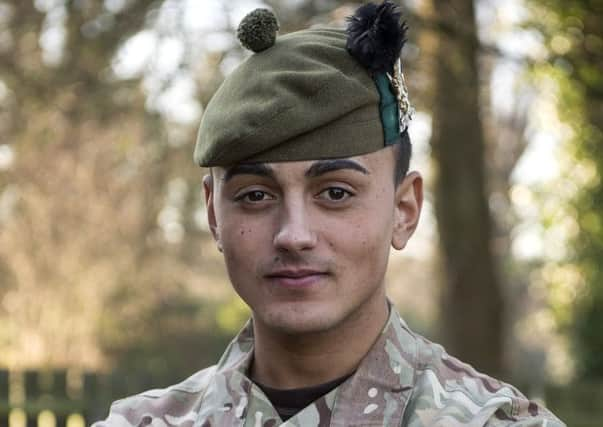Soldiers return after helping tackle Ebola horror


Flown out to west Africa at short notice and tasked with establishing an infrastructure capable of receiving vital aid packages from all over the world, they were forced to adapt to the pressures and strains of a country devastated by the spread of one of the world’s most deadly diseases.
But now the brave servicemen of The Royal Scots Borderers, 1st Battalion The Royal Regiment of Scotland (1 SCOTS) – many of them hailing from the Capital – have returned home to their friends and families after months at the forefront of the fight against Ebola.
Advertisement
Hide AdAdvertisement
Hide AdThe soldiers were flown back to their barracks in Northern Ireland last week to be reunited with their loved ones, with those from Edinburgh due to touch down in the Capital this weekend.
The troops were the first from the UK aid teams to arrive in west Africa and have been working with the Republic of Sierra Leone Armed Forces to battle the disease for the past four months.
Among other duties, they provided security for British aid workers and helped to set up helicopter landing sites and escort convoys to ensure vital supplies could continue to be brought into the country.
And they were also closely involved in the safe evacuation of several international healthcare workers who needed treatment for suspected Ebola virus.
Today, the returning troops spoke of their experiences on the front line of the fight against the disease.
Private Shaun Cole, from Gorgie, said he was looking forward to catching up with friends and finally being back in the Capital.
He said: “I just came back to Northern Ireland last week and it’s been brilliant seeing my family and seeing my friends.
“In Sierra Leone we were acting as a force protection unit and mentoring our own troops, who were building all the hospitals and things. We were putting down measures to stop the Ebola virus spreading.
Advertisement
Hide AdAdvertisement
Hide Ad“It was really good, I really enjoyed it. We all volunteered to go. When we arrived in Sierra Leone all the civilians were delighted to see us. Obviously there is a lot of heartache in the country, but there’s a lot of hope there, too. All over the country has been struck quite badly – Ebola is a terrible virus.”
The 22-year-old, who completed a tour of Afghanistan in 2012, said being thousands of miles away from family and friends over Christmas had been hard, but added that the army had pulled together to make the troops feel at home.
“They made a lot of effort and put on a big Christmas dinner for the boys which we were really pleased with,” he said. “But it is hard being away from your family.”
Around 50 soldiers from the 1st Battalion were flown into Sierra Leone at short notice to help rebuild and establish infrastructures in a country devastated by the rapid spread of Ebola.
The troops joined 800 other soldiers from around the UK in lending a helping hand to local armed forces, as medical teams fought to combat and contain the virus.
Ebola is believed to have killed more than 8000 people in the last year.
The spread of the virus is slowing however, and the World Health Organisation said that the three most affected countries – Guinea, Sierra Leone and Liberia – have reported fewer than 100 cases in the past week, for the first time since June.
Health officials have insisted they are now focused on ending the outbreak rather than just slowing its spread, with the large-scale human trial of two potential Ebola vaccines now under way in Liberia.
Advertisement
Hide AdAdvertisement
Hide AdCaptain Russell Macleod, B Company Second in Command, spent much of his time as military advisor at the Western Area Ebola Response Centre in Freetown. It’s there that surveillance teams respond to emergency calls from the public identifying suspected cases, so that they can be extracted and taken to one of the treatment centres around the district.
He praised the volunteers involved in the running of the centre and pointed to continuing improvements in the team’s response time.
“There is no doubt that this will save lives and it was great to be part of the team making that happen,” he said.
The 1 SCOTS also spent time at the SOS Village Orphanage at Makeni, which is home to over 150 children – many having lost their parents to the Ebola outbreak.
Corporal Stephen McKeown, Section Commander of B Company, 1 SCOTS, described the visit as “not only memorable but so rewarding”.
He added: “To be with children who have probably lost just about everything and to be able to give them a reason to smile, albeit for a short period, makes everything so worthwhile.”
Company Commander Major Nick Colquhoun said he was “immensely proud of the professionalism and maturity” his men had demonstrated during the last four months.
He said: “This is the first time that the majority of these young men have deployed on an operational tour and the demands that have been placed on them have been unique.
“To a man they rose to the challenge, displaying characteristic energy and enthusiasm from the outset. It is a privilege to command them.”
SEE ALSO: